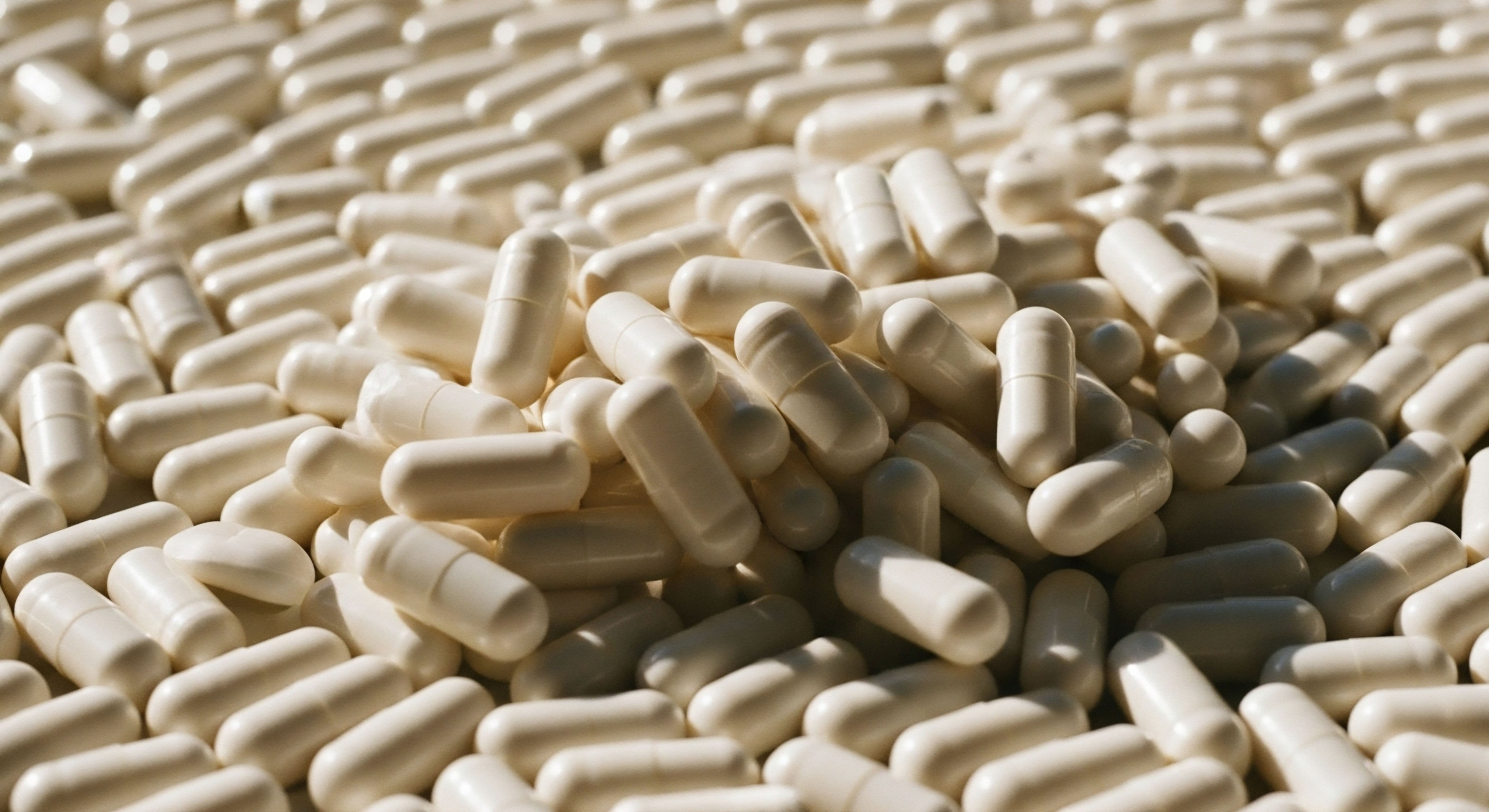

Fundamentals
The persistent, unsettling current of anxiety can feel like an unwelcome companion, particularly when navigating the intricate shifts within your own biological systems. Many individuals experience this profound unease, a sensation that often intensifies during periods of hormonal recalibration, such as those encountered with ongoing endocrine system support regimens.
This lived experience, characterized by a sense of internal disquiet or heightened reactivity, is not merely a psychological phenomenon; it frequently signals a deeper dialogue occurring within the body’s complex biochemical architecture. Understanding these internal communications, the subtle whispers and sometimes louder alarms from your hormonal landscape, marks the initial step toward reclaiming a sense of calm and functional equilibrium.
When considering long-term strategies to mitigate anxiety during hormonal optimization protocols, we begin by acknowledging the fundamental interplay between your endocrine system and your emotional well-being. Hormones, these powerful chemical messengers, orchestrate a vast array of bodily functions, extending their influence deeply into the central nervous system. Fluctuations in their levels, whether naturally occurring or therapeutically induced, can directly impact brain chemistry, influencing the delicate balance of neurotransmitters that govern mood and stress responses.
Anxiety during hormonal shifts often reflects the body’s intricate biochemical responses to changing internal conditions.
The human body possesses an elegant, self-regulating network known as the hypothalamic-pituitary-gonadal (HPG) axis. This axis represents a critical feedback loop involving the hypothalamus in the brain, the pituitary gland, and the gonads (ovaries in women, testes in men). It orchestrates the production and release of sex hormones, including estrogen, progesterone, and testosterone.
When this system operates harmoniously, it contributes to overall physiological stability, which includes emotional regulation. Disruptions within this axis, however, can ripple through various bodily systems, potentially manifesting as symptoms such as anxiety.
Another vital system in the body’s stress response is the hypothalamic-pituitary-adrenal (HPA) axis. This axis involves the hypothalamus, pituitary gland, and adrenal glands, which sit atop the kidneys. When faced with perceived threats or stressors, the HPA axis activates, leading to the release of cortisol, often termed the body’s primary stress hormone.
While this acute stress response is essential for survival, chronic activation or dysregulation of the HPA axis can lead to persistent elevated cortisol levels. Such sustained elevations can impair memory, concentration, and mood regulation, increasing the propensity for anxiety and other emotional disturbances.
The intricate relationship between the HPG and HPA axes is particularly relevant for understanding anxiety during hormonal support. For instance, sex hormones can modulate the activity of the HPA axis. Estrogen, for example, influences cortisol production and the body’s overall stress reactivity.
Similarly, testosterone has been shown to have protective benefits against anxiety and depression, partly through its influence on various brain regions and neurotransmitter systems. A comprehensive understanding of these foundational biological concepts provides the necessary context for exploring effective long-term strategies.


Intermediate
Moving beyond foundational concepts, a deeper exploration into specific clinical protocols reveals how targeted hormonal support can influence anxiety. Hormonal optimization protocols aim to restore physiological balance, and in doing so, they often alleviate the emotional distress linked to endocrine system dysregulation. The precise application of these therapies, tailored to individual biochemical profiles, represents a sophisticated approach to managing anxiety within a broader wellness framework.

Testosterone Replacement Therapy for Men
For men experiencing symptoms of low testosterone, known as hypogonadism, Testosterone Replacement Therapy (TRT) can significantly impact emotional well-being. Low testosterone levels are frequently associated with mood swings, irritability, and anxiety. These emotional fluctuations can be profoundly distressing, affecting daily life and personal connections. TRT works by restoring testosterone to a physiological range, which helps stabilize hormone levels and, in turn, can lead to enhanced emotional stability and a more positive outlook.
The standard protocol for male hormone optimization often involves weekly intramuscular injections of Testosterone Cypionate. This is frequently combined with other agents to maintain natural testicular function and manage potential side effects. For instance, Gonadorelin, administered via subcutaneous injections twice weekly, helps preserve natural testosterone production and fertility by stimulating the pituitary gland.
Additionally, Anastrozole, an oral tablet taken twice weekly, may be included to inhibit the conversion of testosterone to estrogen, thereby reducing estrogen-related side effects that could impact mood. Some protocols also incorporate Enclomiphene to support luteinizing hormone (LH) and follicle-stimulating hormone (FSH) levels, further aiding endogenous testosterone synthesis.
While some men might experience heightened anxiety during the initial adjustment period of TRT as hormone levels recalibrate, these effects are typically temporary and resolve with dosage refinement. Long-term data often indicates reduced anxiety and improved emotional regulation as a consistent benefit of appropriate testosterone restoration.

Testosterone Replacement Therapy for Women
Testosterone, though present in smaller amounts in women, plays a crucial role in mood regulation, energy, and overall vitality. Women, particularly those in perimenopause or postmenopause, can experience symptoms such as irregular cycles, mood changes, and low libido due to declining testosterone levels. Testosterone Replacement Therapy for women, often part of a broader hormonal optimization strategy, can address these concerns.
Protocols for women typically involve lower doses of Testosterone Cypionate, usually 10 ∞ 20 units (0.1 ∞ 0.2ml) weekly via subcutaneous injection. The inclusion of Progesterone is common, prescribed based on menopausal status, as progesterone has a calming effect on the brain and can reduce anxiety.
Some women may also opt for long-acting pellet therapy for testosterone delivery, with Anastrozole considered when appropriate to manage estrogen conversion. By restoring testosterone to optimal levels, women often report better emotional stability, reduced irritability, and decreased feelings of anxiety.
Tailored hormonal support, including testosterone and progesterone, can significantly stabilize mood and reduce anxiety for both men and women.

Growth Hormone Peptide Therapy
Beyond sex hormones, the influence of growth hormone (GH) and its stimulating peptides on mental well-being is gaining recognition. GH is a powerful anxiolytic, meaning it helps reduce anxiety. Research indicates that individuals with GH deficiency often report higher rates of anxiety and depression.
Growth Hormone Peptide Therapy involves the use of specific peptides that stimulate the body’s intrinsic synthesis of human growth hormone. Key peptides include Sermorelin, Ipamorelin/CJC-1295, Tesamorelin, Hexarelin, and MK-677. These agents work by signaling the pituitary gland to produce greater amounts of GH.
A notable advantage of peptides like Ipamorelin is their ability to stimulate GH release without significantly increasing cortisol levels, which can be a concern with other GH secretagogues and could potentially exacerbate anxiety. This selective action helps patients experience the positive aspects of GH optimization, such as improved mood and vitality, while minimizing unwanted side effects.
The table below outlines the general applications of various peptides in relation to overall well-being and anxiety mitigation:
| Peptide | Primary Application | Anxiety Mitigation Relevance |
|---|---|---|
| Sermorelin | General GH stimulation, anti-aging, sleep improvement | Improved sleep quality and overall well-being can indirectly reduce anxiety. |
| Ipamorelin/CJC-1295 | Muscle gain, fat loss, sleep improvement, anti-aging | Stimulates GH without significant cortisol increase, minimizing potential anxiety exacerbation. |
| Tesamorelin | Visceral fat reduction, cognitive function | Improved metabolic health and cognitive clarity can reduce anxiety drivers. |
| Hexarelin | Muscle growth, tissue repair | Physical improvements and recovery can enhance mental resilience. |
| MK-677 (Ibutamoren) | Oral GH secretagogue, anti-aging, sleep | Promotes GH, which has anxiolytic properties; supports overall vitality. |
| PT-141 | Sexual health | Addressing sexual dysfunction can alleviate associated psychological distress and anxiety. |
| Pentadeca Arginate (PDA) | Tissue repair, healing, inflammation reduction | Reducing systemic inflammation can positively impact mood and stress response. |
These targeted interventions, when integrated into a comprehensive wellness plan, represent powerful tools for managing anxiety by addressing underlying hormonal and metabolic factors.


Academic
A comprehensive understanding of long-term anxiety mitigation during hormonal support regimens necessitates a deep dive into the intricate neurobiological and metabolic pathways that govern emotional states. The body’s endocrine system operates not in isolation, but as a finely tuned orchestra, with each hormonal section influencing the others and, crucially, impacting the central nervous system. This systems-biology perspective reveals how optimizing hormonal balance can create a resilient internal environment, thereby reducing susceptibility to anxiety.

The Neuroendocrine Orchestration of Mood
The interplay between hormones and neurotransmitters is central to emotional regulation. Neurotransmitters are chemical messengers that facilitate communication between neurons, directly influencing mood, cognition, and behavior. Hormones, particularly steroid hormones like estrogen, progesterone, and testosterone, exert profound effects on these neural signaling pathways.
- Estrogen’s Influence ∞ Estradiol, a primary estrogen, modulates several neurotransmitter systems critical for mood regulation. It can upregulate serotonin synthesis by increasing the activity of tryptophan hydroxylase, a key enzyme in serotonin production. Serotonin is widely recognized for its role in feelings of well-being and happiness. Estrogen also inhibits monoamine oxidase (MAO), an enzyme that degrades serotonin and other monoamines, allowing these mood-regulating chemicals to remain active for longer. Furthermore, estrogen enhances dopaminergic activity by influencing dopamine receptor density and neurotransmitter release. Dopamine is linked to reward, motivation, and pleasure. Fluctuations in estrogen, particularly the sharp declines seen in perimenopause and menopause, can lead to reduced serotonin and dopamine activity, contributing to mood disturbances and heightened anxiety.
- Progesterone’s Calming Effect ∞ Progesterone, through its metabolite allopregnanolone, significantly influences gamma-aminobutyric acid (GABA) receptors. GABA is the primary inhibitory neurotransmitter in the brain, producing a calming, anxiolytic effect. By enhancing GABA transmission, progesterone can promote relaxation, improve sleep quality, and directly decrease anxiety. Declining progesterone levels in perimenopause can therefore lead to increased sensitivity to stress, sleep disturbances, and heightened anxiety.
- Testosterone’s Protective Role ∞ Testosterone influences mood and mental clarity in both men and women. It plays a role in regulating dopamine, the neurotransmitter associated with reward and motivation. Clinical evidence suggests that testosterone has anxiolytic and antidepressant benefits, particularly in individuals with diagnosed testosterone deficiency. This protective effect may stem from its influence on brain regions involved in emotional processing, such as the hippocampus, which is linked to memory and emotional processing.

The HPA Axis and Metabolic Interconnections
The HPA axis, the body’s central stress response system, is intimately connected with hormonal balance and metabolic function. Chronic stress, whether psychological or physiological, can lead to persistent activation of the HPA axis, resulting in sustained elevated cortisol levels. This prolonged cortisol exposure has widespread detrimental effects across various bodily systems.
Elevated cortisol can impair memory, concentration, and mood regulation, directly increasing the risk of anxiety and depression. Beyond direct neurological effects, HPA axis dysfunction also impacts metabolic health. Chronic stress contributes to insulin resistance and central weight gain, increasing the risk of metabolic disorders. This metabolic dysregulation can, in turn, exacerbate hormonal imbalances and contribute to a cycle of heightened anxiety. For example, insulin resistance can affect sex hormone-binding globulin (SHBG) levels, altering the bioavailability of sex hormones.
How do we ensure hormonal support regimens do not inadvertently worsen anxiety?
The goal of long-term anxiety mitigation is not simply to replace deficient hormones, but to restore a systemic equilibrium that supports robust neurochemical and metabolic function. This requires a comprehensive approach that considers the intricate feedback loops and interdependencies within the body.
Consider the impact of Growth Hormone (GH) on fear memory. Research indicates that GH is a powerful anxiolytic. Studies in mice have shown that male mice lacking the GH receptor in specific somatostatin-expressing neurons exhibited increased anxiety.
Interestingly, the absence of the GH receptor in these neurons also decreased fear memory, suggesting a complex role for GH in modulating both anxiety and fear responses. This highlights that simply increasing GH might not be the sole answer; the specific pathways and receptors involved are critical. Chronic stress can also raise ghrelin levels, which in turn triggers GH secretion, potentially favoring the development of fear memory. This suggests that managing stress is paramount, even when utilizing GH-stimulating peptides.
Optimizing hormonal balance requires a holistic view, considering neurotransmitter modulation, HPA axis function, and metabolic health.
A truly personalized wellness protocol integrates hormonal optimization with strategies that support the HPA axis and metabolic health. This includes:
- Dietary Precision ∞ A nutrient-dense diet, rich in vitamins, minerals (especially magnesium and B vitamins), healthy fats, and proteins, supports adrenal and HPA axis health. Stabilizing blood sugar levels through balanced nutrition can prevent cortisol spikes and subsequent anxiety.
- Lifestyle Optimization ∞ Incorporating stress-reducing practices such as mindfulness meditation, yoga, and deep breathing techniques can help modulate the HPA axis. Prioritizing quality sleep (7-9 hours per night) is essential for HPA axis recovery and overall emotional resilience. Moderate physical activity also improves stress response and overall well-being.
- Targeted Supplementation ∞ Certain adaptogens, such as Ashwagandha and Rhodiola, can support adrenal function and help the body adapt to stress, thereby reducing anxiety. Nutritional supplements like magnesium, Omega-3 fatty acids, and B-complex vitamins play vital roles in neurotransmitter synthesis and nervous system health.
- Monitoring and Adjustment ∞ Regular comprehensive lab testing, including cortisol rhythms, sex hormones, thyroid panel, and metabolic markers, provides crucial data for refining treatment plans. This data-informed approach allows for precise adjustments to hormonal therapies and co-interventions, ensuring sustained benefits and minimizing adverse effects.
The integration of these elements creates a robust framework for long-term anxiety mitigation. It acknowledges that hormonal support regimens are not isolated interventions, but rather a component of a larger system designed to restore the body’s innate capacity for balance and vitality.
The table below summarizes key neurotransmitter interactions with hormones:
| Hormone | Key Neurotransmitters Influenced | Mechanism of Influence | Relevance to Anxiety |
|---|---|---|---|
| Estrogen | Serotonin, Dopamine, Glutamate | Increases serotonin synthesis, inhibits MAO, enhances dopamine receptor density, modulates glutamate. | Low levels linked to mood disturbances, increased anxiety, and depression. |
| Progesterone | GABA | Metabolite allopregnanolone potentiates GABA-A receptors, increasing inhibitory signaling. | Promotes relaxation, reduces anxiety, improves sleep. Decline linked to heightened stress sensitivity. |
| Testosterone | Dopamine, Serotonin | Regulates dopamine, influences brain regions for emotional processing. | Low levels linked to irritability, mood swings, and anxiety; TRT can reduce these symptoms. |
| Cortisol | Various (indirectly via HPA axis) | Chronic elevation impairs neurotransmitter balance, affects memory and mood regulation. | Sustained high levels directly contribute to anxiety and depression. |

References
- White, J. (2024). Neurochemical Modulation of Fear ∞ The Role of Neurotransmitters and Hormones. Journal of Trauma Stress Disorders & Treatment, 13(4), 414.
- DUTCH Test. (2025). How Endogenous Hormones Affect Neurotransmitters.
- Liu, J. et al. (2023). Role of estrogen in treatment of female depression. Aging (Albany NY), 15(19), 10834 ∞ 10846.
- Brinton, R. D. et al. (2015). Steroid Hormones and Their Action in Women’s Brains ∞ The Importance of Hormonal Balance. Frontiers in Neuroscience, 9, 354.
- Zsido, R. G. et al. (2022). The impact of estradiol on serotonin, glutamate, and dopamine systems. Frontiers in Neuroendocrinology, 67, 101010.
- Wang, C. et al. (2000). Testosterone replacement therapy improves mood and well-being in hypogonadal men ∞ a clinical trial. Journal of Clinical Endocrinology & Metabolism, 85(8), 3028-3033.
- Rabkin, J. G. et al. (2000). Testosterone treatment for depression in men with HIV/AIDS. Archives of General Psychiatry, 57(12), 1122-1129.
- Zarrouf, F. A. et al. (2009). Testosterone and depression ∞ systematic review and meta-analysis. Journal of Psychiatric Practice, 15(4), 289-301.
- Donato, J. Jr. et al. (2024). Growth hormone’s influence on neuropsychiatric disorders. Drug Target Review.
- Spencer, S. J. et al. (2015). A ghrelin-growth hormone axis drives stress-induced vulnerability to enhanced fear. Molecular Psychiatry, 20(10), 1190-1198.
- Cleveland Clinic. (2024). Hypothalamic-Pituitary-Adrenal (HPA) Axis ∞ What It Is.
- Restoration Healthcare. (2024). Understanding the HPA Axis ∞ The Stress Response Connection.
- Nutrition Diets Clinic. (2025). Stress, Cortisol & HPA Axis Imbalance ∞ A Functional Medicine Guide.
- OAText. (2024). Hypothalamus-pituitary-adrenal (HPA) axis, chronic stress, hair cortisol, metabolic syndrome and mindfulness.
- Open Exploration Publishing. (2025). The HPA Axis in Health and Disease.

Reflection
The journey toward understanding your own biological systems is a deeply personal one, a continuous process of learning and adaptation. This exploration of hormonal health, metabolic function, and their profound connection to anxiety offers a lens through which to view your experiences not as isolated incidents, but as interconnected signals from an intelligent internal landscape. The insights shared here are not a definitive endpoint, but rather a starting point for your own proactive engagement with vitality.
Consider how the subtle shifts in your daily rhythms, the quality of your sleep, or the composition of your meals might be communicating with your endocrine and nervous systems. Each choice, each habit, contributes to the intricate symphony of your internal biochemistry.
Reclaiming a sense of calm and functional well-being during hormonal support regimens involves a commitment to listening to these signals and responding with informed, personalized strategies. This path invites you to become an active participant in your health, moving beyond passive observation to a place of empowered self-stewardship.

What Personal Commitments Support Hormonal Balance?
The knowledge presented is a framework, a map for navigating complex terrain. Your unique biological blueprint requires a tailored approach, one that honors your individual responses and evolving needs. This necessitates a partnership with skilled clinical guidance, translating scientific principles into actionable steps that resonate with your personal journey. The true measure of progress lies not just in the absence of symptoms, but in the sustained presence of vitality, clarity, and a profound sense of internal peace.



